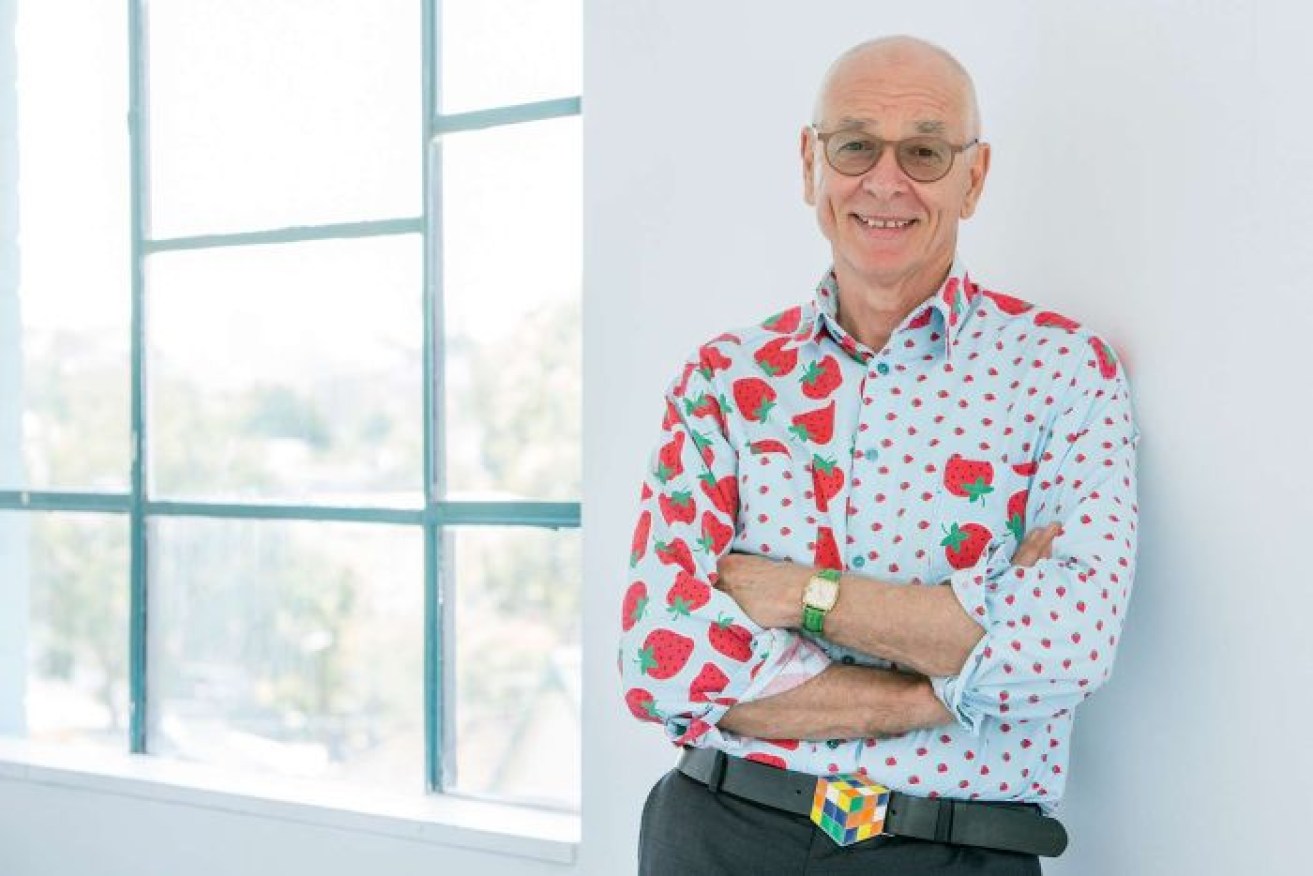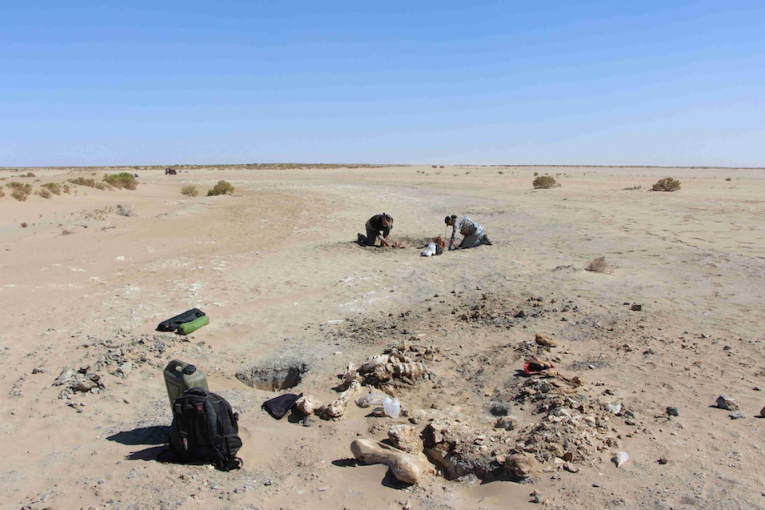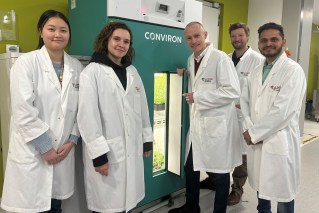Dr Karl Kruszelnicki says he’s ‘not particularly smart’ despite winning UNESCO prize

Dr Karl Kruszelnicki Photo: ABC
He might be one of Australia’s most well-known (and loved) scientists and now the winner of a United Nations award for science communication, but Dr Karl Kruszelnicki doesn’t consider himself that brainy.
“One thing that gives me a great advantage is that I’m not particularly smart, my IQ is only about 110, which is in there with two thirds of the population between 115 and 85,” Dr Karl says.
“That means for me to be able to understand something, I’ve really got to go into it, but then I understand it.”
All that time spent delving into science has not only helped generations Australians better understand the world around (and inside) them, it’s seen Dr Karl awarded the 2019 UNESCO Kalinga Prize for the Popularisation of Science in Budapest this week.

Dr Karl Kruszelnicki in 1968.
Dr Karl is the first Australian to win the prize, which he received in recognition of his “longstanding commitment to fire up people’s curiosity for science and share his passion for the subject”.
Previous winners include Arthur C Clarke, David Suzuki and Sir David Attenborough.
He’s worked as a taxi driver, car mechanic, band roadie, labourer, physicist, engineer, medical doctor and T-shirt manufacturer, but he’s most well-known for sharing his love of science.
For almost 40 years, Dr Karl has been communicating the complexities of science (and nature, health, the environment, technology, mathematics…) to people of all ages through his books and other writing, via his appearances on television and radio, and since 1995 as the Julius Sumner Miller Fellow at the University of Sydney.
He prides himself on being able to explain in minutes concepts or ideas that take him hours to research and understand.
“Normally anything that I can explain to you in a couple of minutes took me at least four or five hours to understand properly.”
So how did this “not particularly smart” “good storyteller” go on to become the loud-shirt-wearing, beloved know-it-all he is today?
In the beginning
Dr Karl was about two-years-old when he and his parents came to Australia from Sweden in the early 1950s.

Rina, Ludwik and a young Karl Kruszelnicki in Sweden in 1950.
The family were initially sent to the migrant camp in Bonegilla in Victoria.
His Polish parents, Rina and Ludwik, both Holocaust survivors, found the move a challenge.
“The weird thing was, my father (for back then) was incredibly highly educated; he had a master’s degree which was very rare,” Dr Karl said.
“For many years here they took no account of any knowledge, education, training, or specific skills that you might have so he started work as a labourer.
“It was a bit of a waste, but at least no-one was shooting at them so that was good.”
Early education
A few years later they moved north to Wollongong, just south of Sydney.
As a young boy, Dr Karl spent hours in the local library.

Karl Kruszelnicki during his time as a physicist for BHP in 1968.
“I started reading at a fairly early age, because that was the way to get by. I was sort of a wog kid being bullied in the middle of all these Irish Catholic kids.”
“The Wollongong Library had all these books on the fairy tales of the world, there were about 140 of them and I read all of them.
“There were amazing similarities and differences and that just sort of blew my mind.”
He went to uni at 16 and within a few years was working as a scientist.
“By the age of 19 I was working as a physicist at the steelworks, testing steel for a bridge, the West Gate Bridge in Melbourne which, by the way, is made of inferior steel … which is absolutely astonishing.”
Working at the steelworks, he started to notice something about those he worked with.

A young Dr Karl Kruszelnicki in 1971.
“There was some people who’d been there for 20 years and had lived 20 years of life and there were other people who’d lived one year and repeated it 20 times.
“They were the people who had no curiosity or joy or excitement about the world. That really influenced how I thought about the world.”
An early career dream, crushed
In the 1980s, he tried to get a gig with NASA.
“I wrote a letter to NASA in 1981 saying ‘Hi NASA, I’m Karl. I’ve got a degree in physics and maths and I’ve also got a degree in biomedical engineering when I designed and built a machine for Fred Hollows to pick up electrical signals off the human retina. I’m in good physical health, I’m about to get a degree in medicine and surgery and so I’m just sort of flagging the fact that I’d like to become an astronaut and work with you guys.'”

Dr Karl Kruszelnicki in 1975. Photo: University of Sydney
The response came in a typed letter with a handwritten signature. (He still has the letter.)
“‘Look, sorry, we’re all full up. But anyway we’re only employing Americans.'”
On becoming a storyteller
Despite his childhood love of fairy tales, Dr Karl couldn’t tell stories when he was younger.
“I hated telling stories, I was really bad at it. I also had great difficulty in telling stories in English, all my life it was just a terribly difficult thing for me to do.
“[My father] really had a bit of an imagination and could occasionally amplify things to make them better, and I might be accused of that from time to time.

Dr Karl eating bush tucker in 1991.
That all changed when his father died during Dr Karl’s first year of studying medicine.
“I started writing stories on Double J and to my surprise I found it fairly easy.
“I don’t know what happened. I know it’s sort of crazy to think that the knowledge jumped out of his brain into mine when he died it got passed on by some sort of Buddhist reincarnation, but certainly that was when I was able to start telling stories.”
Giving up the day job
It was the ’70s when he started working with the original Double J.

Quantum reporter Karl Kruszelnicki (“Dr Karl”), 1985.
At that stage, his media work was a side hustle to his science day jobs, which included working as a physicist, an engineer and a doctor in a children’s hospital.
Dr Karl decided to focus on science communication after a baby died from whooping cough at the hospital he was working in.
“After a 20-year period of zero deaths from whooping cough, we had a baby die from whooping cough. It was because we had A Current Affair pushing both sides of the vaccine argument. There is no argument. There is no other side.”
A job with a long life expectancy
“So even though being a doctor was the best job I’d ever had in my whole life, I knew I could do better for the Australian population by telling people to get vaccinated.”
In the decades since leaving medicine, Dr Karl’s worked for the ABC as a television presenter and reporter, hosted a long-running talkback radio segment on triple j, made a weekly podcast (there are hundreds of episodes of Great Moments in Science) and written dozens of books.
He even made a music video
He’s won a stack of awards and travelled all over the place talking to people about science.
“Basically I had a chance to show people that science is a way to not get fooled, and the ABC gave me that opportunity.”
Dr Karl says the work scientists do make it easy for him to keep doing his job.
“Scientists come up with such amazing stuff all the time, there’s just so much new stuff, it’s just astonishing.
“I’ve stumbled across a career where you’ve got a really long life expectancy because the scientists are always generating new stuff. All I have to do is plagiarise it, what could be easier.”
On wining the award
Dr Karl never expected to win the Kalinga Prize.
“I didn’t really expect it to happen but I just applied anyway and blow me down, there I was.
“I was astonished but also filled with great humility at all the people who’d helped me along the way in the ABC where I’ve made so many mistakes. And they’ve trained me up and people have done so many good things for me. I’ve been so lucky.”
And his advice if you’re thinking about a career in science communication?
Give me a ring and I’ll give you a guided tour through my radio day for one day and then over that time you’ll see what I can do.
His other advice – just write.
“Just sit there and just churn out those words and just send those words off everywhere all over the place and try and get into all the media, even media that overwhelmingly puts forward lies like ‘the Earth is flat’ or ‘that tobacco is good for you’ or ‘that climate change is not real’, because at least you’re getting to a new audience.

Dr Karl Kruszelnicki accepts the Guinness World Record in 2018 for the most people looking at the night sky at once.
“So just keep on churning out that material, just doing it over and over and over again. You get good by doing it and you make mistakes.








